外研社轻松英语名作欣赏小学版
- 格式:wps
- 大小:19.00 KB
- 文档页数:4
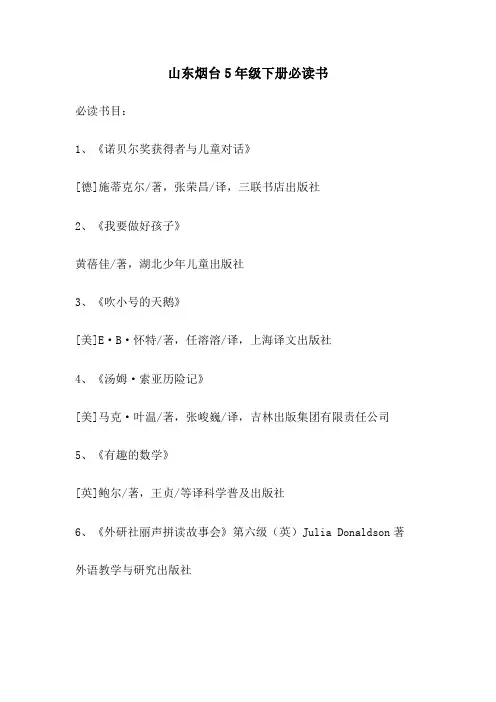
山东烟台5年级下册必读书必读书目:1、《诺贝尔奖获得者与儿童对话》[德]施蒂克尔/著,张荣昌/译,三联书店出版社2、《我要做好孩子》黄蓓佳/著,湖北少年儿童出版社3、《吹小号的天鹅》[美]E·B·怀特/著,任溶溶/译,上海译文出版社4、《汤姆·索亚历险记》[美]马克·叶温/著,张峻巍/译,吉林出版集团有限责任公司5、《有趣的数学》[英]鲍尔/著,王贞/等译科学普及出版社6、《外研社丽声拼读故事会》第六级(英)Julia Donaldson著外语教学与研究出版社推荐阅读:1、《青铜葵花》曹文轩/著,江苏少年儿童出版社2、《时代广场的蟋蟀》[美]乔治·塞尔登/著,傅湘雯/译,二十一世纪出版社3、《可怕的科学·科学新知系列》中的《神奇的互联网》《我为音乐狂》《超能电脑》《密码全攻略》《美妙的电影》《超级建筑》《街上.流行机器人》作者:[英]尼克·阿诺德、迈克尔·科尔曼、迈古尔·考科斯等,译者:庚林、春城等,插图作者:[英]克里夫·高达德、艾丹·波茨、菲利浦·瑞弗等北京少年儿童出版社4、《可怕的科学·经典数学系列》中的《测来测去长度、面积和体积》《逃不出的怪圈——圆和其他图形》《特别要命的数学》(英国)卡佳坦·波斯基特译者:张乐曹飞刘阳等插图作者:(英国)菲利浦·瑞弗(英国)丹尼奥·波斯盖特(英国)特雷弗·邓顿合著者:王渝生北京少年儿童出版社6、《小王子》[法]圣埃克苏佩里/著,周国强/译,上海人民美术出版社7、《轻松英语名作欣赏》(小学版)第4级外语教学与研究出版社。
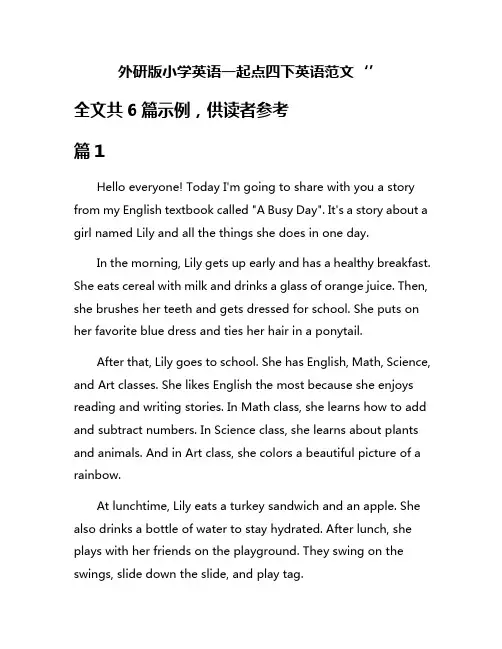
外研版小学英语一起点四下英语范文‘’全文共6篇示例,供读者参考篇1Hello everyone! Today I'm going to share with you a story from my English textbook called "A Busy Day". It's a story about a girl named Lily and all the things she does in one day.In the morning, Lily gets up early and has a healthy breakfast. She eats cereal with milk and drinks a glass of orange juice. Then, she brushes her teeth and gets dressed for school. She puts on her favorite blue dress and ties her hair in a ponytail.After that, Lily goes to school. She has English, Math, Science, and Art classes. She likes English the most because she enjoys reading and writing stories. In Math class, she learns how to add and subtract numbers. In Science class, she learns about plants and animals. And in Art class, she colors a beautiful picture of a rainbow.At lunchtime, Lily eats a turkey sandwich and an apple. She also drinks a bottle of water to stay hydrated. After lunch, she plays with her friends on the playground. They swing on the swings, slide down the slide, and play tag.In the afternoon, Lily has soccer practice. She kicks the ball with her friends and practices dribbling and shooting goals. After practice, Lily goes home and helps her mom make dinner. They cook spaghetti with meatballs and salad.In the evening, Lily does her homework. She reads a story about a princess and answers questions about it. Then, she practices spelling words and does a math worksheet. After finishing her homework, Lily watches her favorite cartoon on TV before bedtime.Finally, Lily brushes her teeth again and changes into her pajamas. She crawls into bed, kisses her parents goodnight, and falls asleep dreaming about all the fun things she did that day.I hope you enjoyed hearing about Lily's busy day! It's important to eat healthy, study hard, play with friends, and help out at home. Remember to do your best every day and have a great time learning English! Bye for now!篇2Hello everyone! Today I'm going to write an English composition for the Youshang Elementary School English textbook Unit 4. Let's get started!Title: My Favorite AnimalMy favorite animal is a cat. Cats are so cute and playful. They have soft fur and big, bright eyes. I have a pet cat at home and I love playing with her every day.My cat's name is Fluffy. She has orange and white fur and she loves to curl up in my lap when I'm watching TV. Fluffy is very clever and she can even do tricks like jumping through hoops and chasing after balls.I like to feed Fluffy fish-flavored cat food and give her lots of treats. She always purrs and rubs against my legs when she's happy. I also like to brush her fur and make sure she's clean and healthy.Sometimes Fluffy likes to go outside and explore the neighborhood. She comes back with leaves in her fur and a proud look on her face. I always give her a hug and tell her how much I missed her.I think cats are the best pets in the world because they're so funny and loving. Fluffy is my best friend and I can't imagine life without her.That's all for my composition about my favorite animal. I hope you enjoyed reading it! Thank you for listening.篇3Title: My Day at SchoolHey guys! I want to tell you all about my day at school. It was so much fun!First of all, we had English class in the morning. Our teacher taught us some new words and we played a game to practice them. It was really cool! I love learning new words in English.After that, we had Math class. Math is not my favorite subject, but our teacher is really nice and she makes it fun. We played a math game with dice and I won! I felt like a math genius.Then it was time for lunch. I brought my favorite snack – a peanut butter and jelly sandwich. It was so yummy! I also played with my friends in the playground. We ran around and played games until the bell rang.In the afternoon, we had Science class. We learned about plants and how they grow. Our teacher showed us how to plant a seed and we each got to plant our own. I can't wait to see it grow!Finally, it was time to go home. I packed up my bag and said goodbye to my friends. I can't wait to come back to school tomorrow and do it all over again.I had such a great day at school. I love learning new things and playing with my friends. School is the best! See you tomorrow!篇4Title: My School LifeHey everyone! My name is Lily and I want to tell you about my awesome school life. I study at a cool school called ABC Primary School and I am in Grade 4.Every day, I wake up early in the morning and get ready for school. I eat my breakfast quickly because I don't want to be late for the flag raising ceremony. It's so much fun to sing the national anthem and school song with my friends.In class, I have different subjects like English, Math, Science, and Art. My favorite subject is English because I love reading and writing stories. My English teacher, Miss Lucy, is really nice and always encourages us to speak in English.During break time, I love playing with my friends on the playground. We play games like tag, jump rope, and soccer. Sometimes, we just sit and chat about our favorite TV shows and hobbies.After school, I attend different clubs like the Art Club and the Science Club. I enjoy drawing and painting in the Art Club, and conducting experiments in the Science Club. Learning new things is so much fun!On weekends, my friends and I sometimes go to the park or the mall together. We have picnics, ride bikes, and shop for cute accessories. It's great to spend time with my friends outside of school.I really love my school life and I feel grateful for my teachers and friends. I can't wait to make more happy memories in the future. School is the best!That's all for now. Thanks for reading about my school life. Bye-bye!篇5Title: My Fun Summer VacationYay! Summer vacation is finally here! I had so much fun during my summer break. Let me tell you all about it.First, I went to the beach with my family. We built sandcastles, splashed in the ocean, and ate yummy ice cream. I even learned how to surf! It was so cool riding the waves.Next, we went to visit my grandparents in the countryside. We played in the fields, picked fresh fruits, and had a barbecue in the backyard. My grandma even taught me how to bake cookies. They were the best cookies I've ever eaten!After that, I joined a summer camp with my friends. We went hiking in the mountains, had a campfire with roasted marshmallows, and told spooky stories. I was a little scared, but it was so much fun.Finally, I spent some time at home relaxing and reading books. I read all my favorite stories and even started writing my own little book. Maybe one day I'll be a famous author!Overall, my summer vacation was amazing. I had so much fun and made lots of wonderful memories. I can't wait for next summer to come so I can do it all over again! Summer vacation is the best!And that's the end of my story about my super fun summer vacation. I hope you enjoyed reading it as much as I enjoyed writing it. Goodbye for now!篇6Oh, hello everyone! Today I'm going to tell you about a story from my English textbook, "My new friend".Last week, I went to the park with my mom. I saw a little girl playing by herself on the swings. I decided to go over and say hello. Her name was Lucy and she was very nice. We played together for hours, laughing and running around the park.After that day, Lucy and I became best friends. We would meet at the park every day after school and play together. Sometimes we would bring our favorite toys and share them with each other. Lucy had a pink doll that she loved very much, and I had a toy car that I always brought with me.One day, it started raining while we were playing. Lucy and I ran to the shelter to hide from the rain. We laughed and talked about all the fun we had together. Lucy said she was happy to have a friend like me, and I felt the same way. We promised to always be there for each other no matter what.From that day on, Lucy and I were inseparable. We would do everything together, from playing in the park to having sleepovers at each other's houses. I was so grateful to have met Lucy, my new friend.I learned that friendship is a special bond that can bring great joy and happiness to our lives. I will always treasure the memories I made with Lucy and cherish our friendship forever.So, boys and girls, remember to be kind and make new friends. You never know when you might meet someone who will change your life for the better, just like Lucy did for me.!(Friendship forever!)。
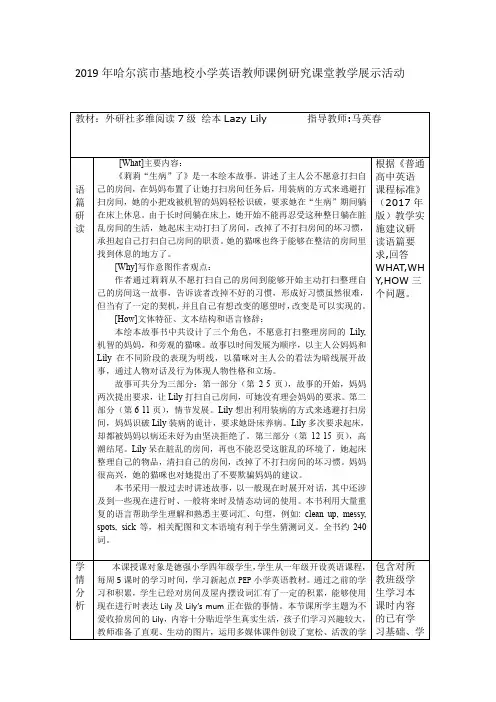
2019年哈尔滨市基地校小学英语教师课例研究课堂教学展示活动习环境和真实、有意义的活动场景,设计了多样的学生喜爱的教学活动,让学生在情境中漫入式地感受语言、运用语言,同时发展学生的综合素质。
在各种活动中,学生都在“玩中学,学中玩”形成了一个生机勃勃的生生互动的学习场面,既达成了巩固、运用所学内容的目的,又实现了伙伴合作学习的目的。
但是本课涉及到学生未学习过的一般过去时,并且学生对绘本阅读学习模式陌生,学习起来可能会遇到不同程度的困难。
习起点进行分析。
课程标准中的相关陈述在图片的帮助下读懂并将输简单的故事,在教师的帮助下表演小故事或小短剧。
在学习中了与参与、积极合作、主动请教。
明确《义务教育课程标准》(2011年版)和《普通高中课程标准》(2017年版)中对于本课教学内容的相关要求。
教学目标在本课学习中,学生能够:1. 预测故事;提取(找出)故事的要素(人物、场景、发生、发展、结局等);2. 阅读故事,理解故事内容和新语言,梳理故事的发展脉络;3. 回顾故事的发生、发展和结局,发现故事讲述语言的动词特点;4. 深入分析发现莉莉是怎样发生变化的,并分享自己改掉坏习惯形成好习惯的经验。
确定本堂课各环节教学目标教学环节设计环节1——学习理解活动目标教学活动课堂指令和问题设计课件、板书时间课前热身歌曲热身,师生互动Welcome to Kenzi’s English1.预测故事;提取(找出)故事的要素(人物、场景、发生、发展等)。
2.阅读故事,理解故事内容和新语言第一步:导入主题,预测故事,引起阅读兴趣1.学生看封面插图,预测故事中的人物、故事发生地点。
尝试阅读英文书名,澄清词义。
根据封面和书名进行故事内容预测。
2.教师引导学生逐图观察故事插图,进行故事预测,引发学生的思考,引起学生的阅读兴致。
第二步:逐页阅读故事,解码生词,理解故事和猜测词义。
1.阅读p2、31)读前看图提出疑问2)学生自己阅读p2、3,圈出不会读的词,划出不懂的词句。
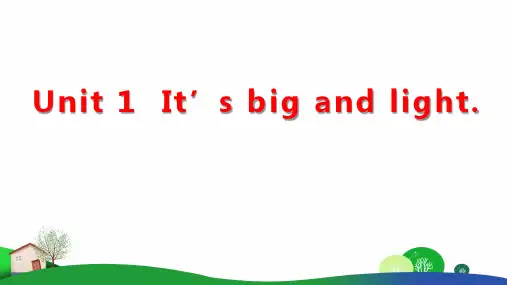
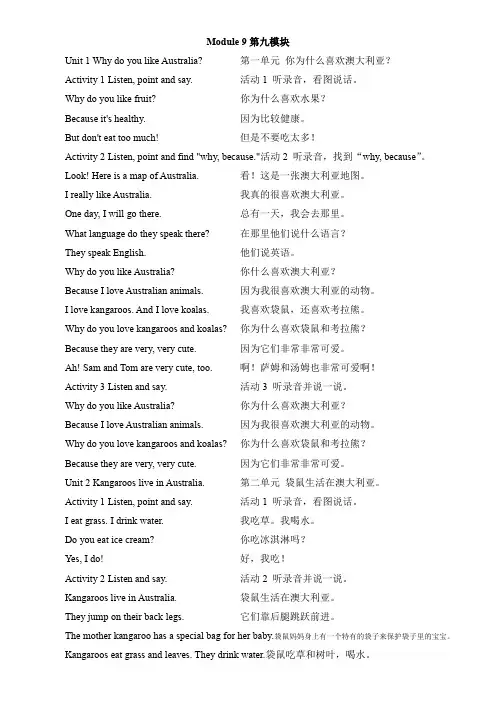
Module 9第九模块Unit 1 Why do you like Australia? 第一单元你为什么喜欢澳大利亚?Activity 1 Listen, point and say. 活动1 听录音,看图说话。
Why do you like fruit? 你为什么喜欢水果?Because it's healthy. 因为比较健康。
But don't eat too much! 但是不要吃太多!Activity 2 Listen, point and find "why, because."活动2 听录音,找到“why, because”。
Look! Here is a map of Australia. 看!这是一张澳大利亚地图。
I really like Australia. 我真的很喜欢澳大利亚。
One day, I will go there. 总有一天,我会去那里。
What language do they speak there? 在那里他们说什么语言?They speak English. 他们说英语。
Why do you like Australia? 你什么喜欢澳大利亚?Because I love Australian animals. 因为我很喜欢澳大利亚的动物。
I love kangaroos. And I love koalas. 我喜欢袋鼠,还喜欢考拉熊。
Why do you love kangaroos and koalas? 你为什么喜欢袋鼠和考拉熊?Because they are very, very cute. 因为它们非常非常可爱。
Ah! Sam and Tom are very cute, too. 啊!萨姆和汤姆也非常可爱啊!Activity 3 Listen and say. 活动3 听录音并说一说。
Why do you like Australia? 你为什么喜欢澳大利亚?Because I love Australian animals. 因为我很喜欢澳大利亚的动物。
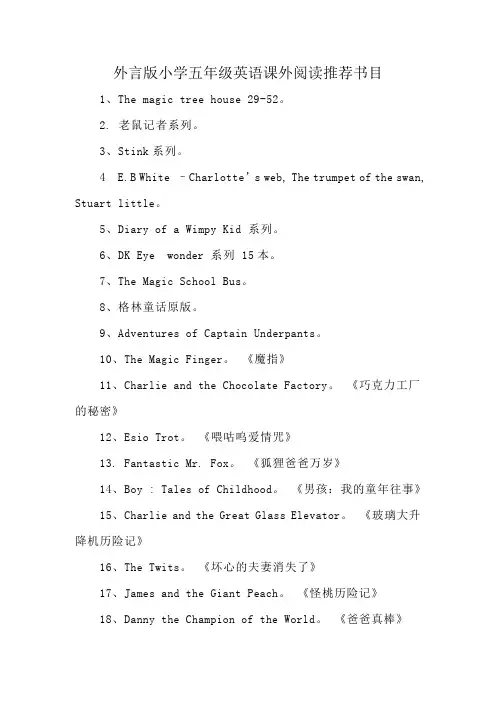
外言版小学五年级英语课外阅读推荐书目1、The magic tree house 29-52。
2. 老鼠记者系列。
3、Stink系列。
4 E.B White –Charlotte’s web, The trumpet of the swan, Stuart little。
5、Diary of a Wimpy Kid 系列。
6、DK Eye wonder 系列 15本。
7、The Magic School Bus。
8、格林童话原版。
9、Adventures of Captain Underpants。
10、The Magic Finger。
《魔指》11、Charlie and the Chocolate Factory。
《巧克力工厂的秘密》12、Esio Trot。
《喂咕呜爱情咒》13. Fantastic Mr. Fox。
《狐狸爸爸万岁》14、Boy : Tales of Childhood。
《男孩:我的童年往事》15、Charlie and the Great Glass Elevator。
《玻璃大升降机历险记》16、The Twits。
《坏心的夫妻消失了》17、James and the Giant Peach。
《怪桃历险记》18、Danny the Champion of the World。
《爸爸真棒》19、George’s Marvelous Medicine。
《小乔治的神奇魔药》20、 Going Solo。
《独行》21、The Witches。
《女巫》22、 Matilda。
《玛迪达》23、The Giraffe and the Pelly and Me。
《长颈鹿、小鹈儿与我》24、The BFG。
《吹梦巨人》25、《体验少儿阅读文库》。
26、培生儿童英语分级阅读第八级。
27、《轻松英语名作欣赏》。
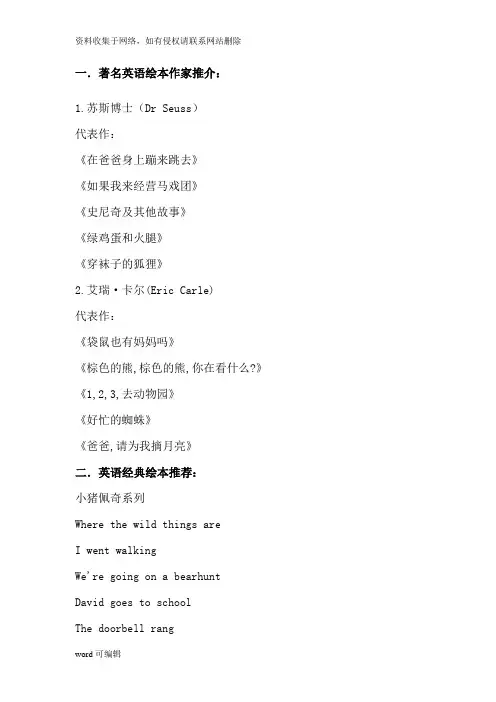
一.著名英语绘本作家推介:
1.苏斯博士(Dr Seuss)
代表作:
《在爸爸身上蹦来跳去》
《如果我来经营马戏团》
《史尼奇及其他故事》
《绿鸡蛋和火腿》
《穿袜子的狐狸》
2.艾瑞·卡尔(Eric Carle)
代表作:
《袋鼠也有妈妈吗》
《棕色的熊,棕色的熊,你在看什么?》《1,2,3,去动物园》
《好忙的蜘蛛》
《爸爸,请为我摘月亮》
二.英语经典绘本推荐:
小猪佩奇系列
Where the wild things are
I went walking
We're going on a bearhunt
David goes to school
The doorbell rang
三.外研社英语分级阅读书目推荐
丽声英语阅读书单(小学一年级)
丽声英语阅读书单(小学二年级)
丽声英语阅读书单(小学三年级)
丽声英语阅读书单(小学四年级)
丽声英语阅读书单(小学五年级)
丽声英语阅读书单(小学六年级)。
![外研社(三起)小学英语五年级下册Unit 1[1] 课件](https://uimg.taocdn.com/cb67d71a4a73f242336c1eb91a37f111f1850d1c.webp)
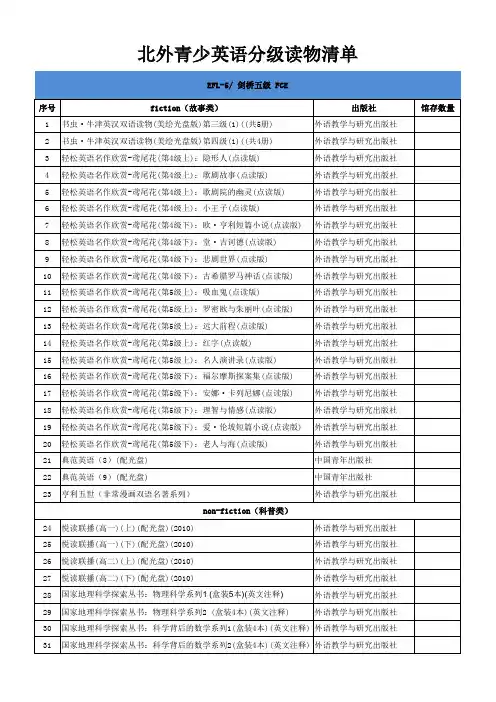

盐城市小学生课外阅读书目Company number【1089WT-1898YT-1W8CB-9UUT-92108】伍佑小学课外阅读推荐书目(一年级上册)必读:1.《团圆》(绘本)余丽琼文朱成梁图2.《猜猜我有多爱你》(绘本) [英]山姆·麦克布雷尼着3.《哪吒闹海》4.《365夜故事》鲁兵主编5.《小巴掌童话》张秋生着选读:1.《纸马》(绘本)熊亮着2.《大卫去上学》(绘本) [美]大卫·香农?3.《落叶跳舞》(绘本) [日]伊东宽着4.《小黄和小蓝》(绘本) [美]李欧·李奥尼着5.《大脚丫跳芭蕾》(绘本) [美]埃米·扬着6.《蝴蝶·豌豆花》金波主编7.《百岁童谣》山蔓编着8.《中国古代神话故事》9.《要是你给老鼠吃饼干》 [美]劳拉·乔菲·努梅罗夫着10.《蚯蚓的日记》 [美]朵琳·克罗宁着必背古诗:1.江南(江南可采莲)汉乐府2.古朗月行(小时不识月)李白?伍佑小学课外阅读推荐书目(一年级下册)必读:1.《逃家小兔》(绘本) [美]玛格丽特·怀兹·布朗着2.《爷爷一定有办法》(绘本) [加拿大]菲比·吉尔曼着3.《中华歌谣100首》4.《小老虎历险记》汤素兰着5.《声律启蒙》车万育着选读:1.《爱心树》(绘本) [美]谢尔·希尔弗斯坦着2.《小黑鱼》(绘本) [美]李欧·李奥尼着3.《花婆婆》(绘本) [美]芭芭拉·库尼着4.《鳄鱼爱上长颈鹿》(绘本) [德]达妮拉·库洛特着5.《花格子大象艾玛》(绘本) [英]大卫·麦基着6.《365 夜儿歌》许海琼编7.《小猪唏哩呼噜》孙幼军着8.《中国古代民俗故事》9.《我爸爸》 [英]安东尼·布朗着10.《我妈妈》 [英]安东尼·布朗着必背古诗:1.村居(草长莺飞二月天)高鼎2.咏鹅(鹅鹅鹅)骆宾王3.悯农(锄禾日李绅4.悯农(春种一粒粟)李绅5.江上渔者(江上往来人)范仲淹伍佑小学课外阅读推荐书目(二年级上册)必读:1.《爱心企鹅》(绘本) [德]克里斯蒂安·贝尔格着2.《三只小猪》(绘本) [美]大卫·威斯纳着3.《三毛流浪记》张乐平着4.《没头脑和不高兴》任溶溶着5.《洋葱头历险记》 [意大利]贾尼·罗大里着选读:1.《风到哪里去了》(绘本) [美]夏洛特·左罗托夫着2.《不一样的卡梅拉》系列(绘本) [法] 克利斯提昂·约里波瓦着3.《弟子规》李毓秀着4.《大个子老鼠小个子猫》系列周锐着5.《书本里的小蚂蚁》王一梅着6.《猪小锅和狼小怪》系列梅艳着7.《妹妹的红雨鞋》林焕章着8.《成语故事》9.《我的野生动物朋友》 [法]蒂皮·德格雷着10.《了不起的狐狸爸爸》 [英]罗尔德·达尔着必背古诗:1.静夜思(床前明月光)李白2.长歌行(青青园中葵)汉乐府3.登鹳雀楼(白日依山尽)王之涣4.赋得古原草送别(离离原上草)白居易5.鹿柴(空山不见人)王维6.敕勒歌(敕勒川)北朝民歌伍佑小学课外阅读推荐书目(二年级下册)必读:1.《犟龟》(绘本) [德]米切尔·恩德着2.《我的爸爸叫焦尼》(绘本) [瑞典] 波·R·汉伯格着3.《戴小桥和他的哥们儿》梅子涵着4.《安徒生童话》[丹麦]安徒生着5.《绿野仙踪》 [美]莱曼·弗兰克·鲍姆着选读:1.《失落的一角》(绘本) [美]希尔弗斯坦着2.《月亮的味道》(绘本) [波兰]麦克·格雷涅茨着3.《三字经》王应麟着4.《泡泡儿去旅行》薛涛着5.《神奇校车》系列 [美]乔安娜·柯尔着6.《地心游记》 [法]凡尔纳着7.《会飞的教室》 [德]艾利克·卡斯特纳着8.《大战火星人》 [英]赫伯特·乔治·威尔斯着9.《我爱唠叨的妈妈》 [韩]朴惠淑姜析昊着10.《让孩子着迷的77×2个经典科学游戏》 [日]后藤道夫着必背古诗:1.春夜喜雨(好雨知时节)杜甫2.春晓(春眠不觉晓)孟浩然3.游子吟(慈母手中线)孟郊4.忆江南(江南好)?白居易5.绝句(迟日江山丽)杜甫6.咏柳(碧玉妆成一树高)贺知章?伍佑小学课外阅读推荐书目(三年级上册)语文必读:1.《皮皮鲁传》郑渊洁着2.《怪老头儿》孙幼军着3.《格林童话》 [德]雅科布·格林、威廉·格林着4.《木偶奇遇记》[意大利]科洛迪着5.《列那狐传奇故事》 [法]季诺着选读:1.《我有友情要出租》(绘本)方素珍着郝洛玟图2.《鲁西西传》郑渊洁着3.《神笔马良》洪汛涛着4.《阿凡提的故事》赵世杰编译5.《小飞侠彼得·潘》 [英]巴里·麦考琳着6.《我的第一本科学漫画书》之《儿童百问百答》[韩]李泰虎着7.《特别女生撒哈拉》 [美]爱斯米·科德尔着8.《亚马孙探险——哈尔罗杰历险记》 [英]威勒德·普赖斯着9.《游戏中的科学》 [德]汉斯·尤尔根·普雷斯着10.《苹果树上的外婆》 [奥地利]米拉·洛贝着必背古诗:1.山行(远上寒山石径斜)杜牧2.枫桥夜泊(月落乌啼霜满天)张继3.竹石(咬定青山不放松)郑燮4.九月九日忆山东兄弟(独在异乡为异客)王维5.四时田园杂兴(梅子金黄杏子肥)范成大6.早春呈水部张十八员外(天街小雨润如酥)韩愈英语必读:1.快乐英语阅读三年级第1卷译林出版社2.外教社·朗文小学英语分级阅读1 上海外语教育出版社3.白雪公主Snow White 轻松英语名着欣赏(小学版)选读:1.丽声妙想英文绘本第一级外语教学与研究出版社2.磨出我的英文耳朵1 机械工业出版社3.穿靴子的猫Puss in Boots 轻松英语名着欣赏(小学版)4.林克妈妈英文三字经伍佑小学课外阅读推荐书目(三年级下册)语文必读:1.《乌丢丢的奇遇》金波着2.《男生贾里》秦文君着3.《爱丽丝漫游奇境》 [英]刘易斯·卡罗尔着4.《吹牛大王历险记》 [德]埃·拉斯伯、戈·毕尔格着5.《小鹿斑比》 [奥地利]费利克斯·萨尔登着选读:1.《十万个为什么》?2.《让太阳长上翅膀》(诗集)金波着3.《女生贾梅》秦文君着4.《讲给孩子的中国地理》刘兴诗着5.《丁丁历险记》 [比利时]埃尔热着6.《魔法师的帽子》 [芬兰]托芙·杨松着7.《丛林之书》 [英]吉卜林着8.《风到哪里去了》 [美]夏洛特·左罗托夫着9.《我和小姐姐克拉拉》 [英]茵可夫着10.《生命的故事》 [美]维吉尼亚·李·伯顿着必背古诗:1.四时田园杂兴(昼出耘田夜绩麻)范成大2.清明(清明时节雨纷纷)杜牧3.塞下曲(月黑雁飞高)卢纶4.望庐山瀑布(日照香炉生紫烟)李白5.绝句(两个黄鹂鸣翠柳)杜甫6.滁州西涧(独怜幽草涧边生)韦应物7.芙蓉楼送辛渐(寒雨连江夜入吴)王昌龄英语必读:1.快乐英语阅读三年级第2卷译林出版社2.外教社·朗文小学英语分级阅读2 上海外语教育出版社3.丑小鸭The Ugly Duckling 轻松英语名着欣赏(小学版)选读:1.丽声妙想英文绘本第二级外语教学与研究出版社2.磨出我的英文耳朵2 机械工业出版社3.体验英语少儿阅读文库第一级高等教育出版社4.冒险岛英语奇遇记1 光明日报出版社5.新概念英语青少版(入门级)Starter A 外语教学与研究出版社6.匹诺曹Pinocchio 轻松英语名着欣赏(小学版)7.小学英语开心阅读训练一二年级8.朗文小学英语阅读(1-2年级)吉林出版集团有限责任公司9.小学英语阅读分级专练(1-2年级)上海交通大学出版社10.小学生英语分级阅读一级(上下)伍佑小学课外阅读推荐书目(四年级上册)语文必读:1.《我要做好孩子》黄蓓佳着2.《狼王梦》沈石溪着3.《时代广场的蟋蟀》 [美]乔治·塞尔登着4.《一百条裙子》 [美]埃莉诺·埃斯特斯着5.《亲爱的汉修先生》 [美]贝芙莉·克莱瑞着选读:1.《一千零一夜》(《天方夜谭》)2.《歇后语谚语大全》3.《追踪小绿人》三部曲金波着4.《淘气包马小跳系列》杨红樱着5.《装在口袋里的爸爸》杨鹏着6.《肩上的童年》曹文芳着7.《水孩子》[英]查尔斯·金斯利着8.《德国一群老鼠的童话》[德]维里·费尔曼着9.《女巫》 [英]罗尔德·达尔着10.《最美的科普》 [德]乌娜·雅各布着必背古诗:1.望洞庭(湖光秋月两相和)刘禹锡2.风(解落三秋叶)李峤3.江雪(千山鸟飞绝)柳宗元4.元日(爆竹声中一岁除)王安石5.早发白帝城(朝辞白帝彩云间)李白6.赠汪伦(李白乘舟将欲行)李白7.浪淘沙(九曲黄河万里沙)刘禹锡英语必读:1.快乐英语阅读四年级第1卷译林出版社2.外教社·朗文小学英语分级阅读3 上海外语教育出版社3.卖火柴的小女孩The Little Match Girl 轻松英语名着欣赏(小学版)选读:1.丽声妙想英文绘本第三级外语教学与研究出版社2.磨出我的英文耳朵3?机械工业出版社3.冒险岛英语奇遇记2 光明日报出版社4.彼得·潘Peter Pan 轻松英语名着欣赏(小学版)5.《英语角小读者》国内统一刊号:CN11-4565/G4;邮发代号:80—481伍佑小学课外阅读推荐书目(四年级下册)语文必读:1.《草房子》曹文轩着2.《夏洛的网》[美]EB·怀特着3.《海底两万里》 [法]凡尔纳着4.《窗边的小豆豆》[日]黑柳彻子着5.《金银岛》 [英]罗伯特·路易斯·史蒂文森着选读:1.《中外名人故事》2.《幼学琼林》程允升着3.《芝麻开门》祁智着4.《班长下台》桂文亚着5.《奇妙的数王国》李佩毓着6.《神冀》郑文光着7.《长袜子皮皮》 [瑞典]阿斯特里德·林格伦着8.《浪漫鼠德佩罗》 [美]凯特·迪卡米洛着9.《柳林风声》 [英]肯尼思·格雷厄姆着10.《总有一天会长大》 [挪]托摩脱·蒿根着必背古诗:1.江南春(千里莺啼绿映红) 杜牧2.小池(泉眼无声惜细流) 杨万里3.池上(小娃撑小艇) 白居易4.小儿垂钓(蓬头稚子学垂纶)胡令能5.惠崇春江晓景(竹外桃花三两枝) 苏轼6.望天门山(天门中断楚江开) 李白7.回乡偶书(少小离家老大回)贺知章8.春日(胜日寻芳泗水滨)朱熹英语必读:1.快乐英语阅读四年级第2卷译林出版社2.外教社·朗文小学英语分级阅读4?上海外语教育出版社3.阿拉丁和神灯Aladdin and the Magic Lamp 轻松英语名着欣赏(小学版)选读:1.丽声妙想英文绘本第四级外语教学与研究出版社2.磨出我的英文耳朵4 机械工业出版社3.体验英语少儿阅读文库第二级高等教育出版社4.冒险岛英语奇遇记3 光明日报出版社5.新概念英语青少版(入门级)Starter B 外语教学与研究出版社6.糖果屋历险记Hansel and Gretel 轻松英语名着欣赏(小学版)伍佑小学课外阅读推荐书目(五年级上册)语文必读:1.《水浒传》施耐庵着2.《青铜葵花》曹文轩着3.《伊索寓言》 [古希腊]伊索着4.《昆虫记》[法]法布尔着5.《爱的教育》[意大利]亚米契斯着选读:1.《寄小读者》? 冰心着2.《蓝鲸的眼睛》冰波着3.《一只狗和他的城市》常新港着4.《我们的母亲叫中国》苏叔阳着5.《白壳艇》李有干着6.《小王子》[法]圣埃克苏佩里着7.《秘密花园》 [美] 弗朗西斯·霍奇森·伯内特着8.《希腊神话》[德]施瓦布着9.《西雅图酋长的宣言》 [美]西雅图酋长着10.《麦琪的礼物》 [美]欧·亨利着必背古诗:1.寻隐者不遇(松下问童子)贾岛2.所见(牧童骑黄牛)袁枚3.黄鹤楼送孟浩然之广陵(故人西辞黄鹤楼)李白4.三衢道中(梅子黄时日日晴)曾几5.出塞(秦时明月汉时关)王昌龄6.凉州词(黄河远上白云间)王之涣7.凉州诃(葡萄美酒夜光杯)王翰8.送元二使安西(渭城朝雨浥轻尘)王维英语必读:1.快乐英语阅读五年级第1卷译林出版社2.外教社·朗文小学英语分级阅读5 上海外语教育出版社3.《英语角小读者》国内统一刊号:CN11-4565/G4;邮发代号:80—482选读:1.丽声妙想英文绘本第五级?外语教学与研究出版社2.磨出我的英文耳朵5 机械工业出版社3.体验英语少儿阅读文库第三级高等教育出版社4.冒险岛英语奇遇记4 光明日报出版社5.新概念英语青少版1A?外语教学与研究出版社6.“英语短片连连看”系列(我的泰迪熊)Unit1-57.小公主A Little Princess 轻松英语名着欣赏(小学版)8.黑骏马Black Beauty 轻松英语名着欣赏(小学版)伍佑小学课外阅读推荐书目(五年级下册)语文必读:1.《论语》孔子着2.《呼兰河传》萧红着3.《西游记》吴承恩着4.《骑鹅旅行记》[瑞典]拉格洛芙着5.《假如给我三天光明》[美]海伦·凯勒着选读:1.《上下五千年》林汉达编着2.《女儿的故事》梅子涵着3.《故事中的数学》谈祥柏着4.《活了一百万次的猫》(绘本)[日]佐野洋子着5.《蓝色的海豚岛》? [美]斯·奥台尔着6.《苦儿流浪记》[法]埃克多·马洛着7.《永远讲不完的故事》 [德]米切尔·恩德着8.《屋顶上的小孩》 [美]奥黛莉·克伦毕斯着9.《神秘岛》[法]儒勒·凡尔纳着10.《风与树的歌》[日]安房直子着必背古诗:1.游园不值(应怜屐齿印苍苔)叶绍翁2.六月二十七日望湖楼醉书(黑云翻墨未遮山) 苏轼3.晓出净慈寺送林子方(毕竟西湖六月中) 杨万里4.别董大(千里黄云白日曛) 高适5.泊船瓜洲(京口瓜洲一水间) 王安石6.蜂(不论平地与山尖) 罗隐7.书湖阴先生壁(茅檐长扫净无苔) 王安石8.饮湖上初晴后雨(水光潋滟晴方好) 苏轼英语必读:1.快乐英语阅读五年级第2卷译林出版社2.外教社·朗文小学英语分级阅读6 上海外语教育出版社3.灰姑娘Cinderella 轻松英语名着欣赏(小学版)选读:1.丽声妙想英文绘本第六级外语教学与研究出版社2.磨出我的英文耳朵6 机械工业出版社3.英语少儿阅读文库第四级高等教育出版社4.冒险岛英语奇遇记5? 光明日报出版社5.《剑桥少儿英语》一级?6.“英语短片连连看”系列(我的泰迪熊)Unit6-107.爱丽丝漫游仙境Alice in Wonderland 轻松英语名着欣赏(小学版)伍佑小学课外阅读推荐书目(六年级上册)语文必读:1.《三国演义》?罗贯中着2.《城南旧事》林海音着3.《漂亮老师和坏小子》?杨红樱着4.《鲁滨逊漂流记》[英]丹尼尔·笛福着5.《汤姆·索亚历险记》[美]马克·吐温着选读:1.《第三军团》?张之路着2.《放慢脚步去长大》章红着3.《狼图腾》姜戎着4.《中国出了个毛泽东》上海古籍出版社5.《叶永烈讲述科学家故事100个》叶永烈编着6.《克雷洛夫寓言》 [俄]伊凡·安德烈维奇·克雷洛夫着7.《哈利·波特》系列[英]J·K·罗琳着8.《追风筝的人》 [美]卡勒德·胡赛尼着9.《福尔摩斯探案集》[英]柯南·道尔着10.《我能跳过水洼》 [澳]艾伦·马歇尔着必背古诗:1.示儿(死去元知万事空)陆游2.观书有感(半亩方塘一鉴开)朱熹3.己亥杂诗(九州生气恃风雷)龚自珍4.江畔独步寻花(黄师塔前江水东)杜甫5.秋夜将晓出篱门迎凉有感(三万里河东入海)陆游6.题西林壁(横看成岭侧成苏轼7.题临安邸(山外青山楼外楼)林升8.乡村四月(绿遍山原白满川) 翁卷英语必读:1.快乐英语阅读六年级第1卷译林出版社2.外教社·朗文小学英语分级阅读7? 上海外语教育出版社3.王子和贫儿The Prince and the Pauper 轻松英语名着欣赏(小学版)选读:1.丽声妙想英文绘本第七级外语教学与研究出版社2.磨出我的英文耳朵7? 机械工业出版社3.体验英语少儿阅读文库第五级高等教育出版社4.贝贝熊“I can read”双语阅读系列6本5.童话盒子有声双语绘本第一级6.秘密花园The Secret Garden 轻松英语名着欣赏(小学版)7.风雨河岸柳The Wind in the Willow 轻松英语名着欣赏(小学版)伍佑小学课外阅读推荐书目(六年级下册)语文必读:1.《唐诗宋词三百首》2.《今天我是升旗手》黄蓓佳着3.《少女的红发卡》程玮着4.《老人与海》 [美]海明威着5.《格列佛游记》? [英]乔纳森·斯威夫特着选读:1.《蓝调江南》金曾豪着2.《潘家铮院士科幻作品集》潘家铮着3.《绿山墙的安妮》 [加]露西·莫德·蒙哥马利着4.《阁楼上的光》(诗集) [美]希尔弗斯坦着5.《居里夫人自传》 [法]玛丽·居里着6.《谁动了我的奶酪》 [美]斯宾塞·约翰逊着7.《诺贝尔奖获得者与儿童的对话》 [德]贝蒂娜·施蒂克8.《热爱生命》 [美]杰克·伦敦着9.《写给孩子的哲学启蒙书》 [法]碧姬·拉贝着10.《希利尔讲艺术史》 [美] .希利尔着必背古诗:1.渔歌子(西塞山前白鹭飞)张志和2.夏日绝句(生当作人杰)李清照3.墨梅(吾家洗砚池头树) 王?冕4.石灰吟(千锤万凿出深山)于谦英语必读:1.快乐英语阅读六年级第2卷译林出版社2.外教社·朗文小学英语分级阅读8-10 上海外语教育出版社3.汤姆·索亚历险记The Adventures of Tom? 轻松英语名着欣赏(小学版)选读:1.丽声妙想英文绘本第八级?外语教学与研究出版社2.磨出我的英文耳朵8?机械工业出版社3.体验英语少儿阅读文库第六级高等教育出版社4.新概念英语青少版1B 外语教学与研究出版社5.童话盒子有声双语绘本第二级6.《剑桥少儿英语》二级7.绿山墙的安妮Ann of Green Gables 轻松英语名着欣赏(小学版)8.堂·吉可德Don Quixote 轻松英语名着欣赏(小学版)9.威尼斯商人The Merchant of Venice? 轻松英语名着欣赏(小学版)10.白色巨石The White Stones书虫·牛津入门级上11.生存游戏Survive!书虫·牛津入门级上12.伊索寓言Aesop's Fables 津津有味·读经典Level 1。
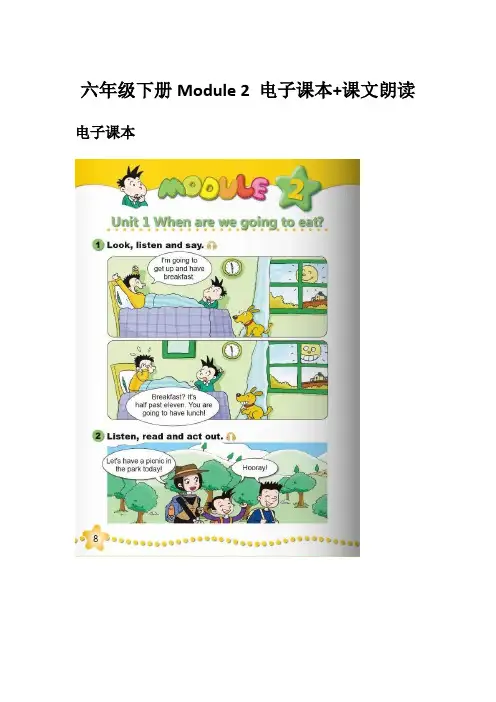
六年级下册Module 2 电子课本+课文朗读电子课本重点单词短语later [ˈleɪtə(r)] 后来,以后to go剩余duck [dʌk] 鸭子pond [pɒnd] 水池,池塘cloud [klaʊd] 云dry [draɪ] 干的like [laɪk] 像......一样look like [luk laik] 看来好像stay [steɪ] 保持,维持课文翻译Module 2 Unit 1 Listen,read and act out.Let's have a picnic in the park today!让我们今天在公园野餐吧!Hooray!万岁!Later...后来……Simon: I'm hungry. When are we going to eat, Mum?西蒙:我饿了。
我们打算什么时候吃饭,妈妈?Simon's mum: At half past twelve.西蒙的妈妈:在十二点半。
Simon: What time is it now?西蒙:现在几点了?Simon's mum: It' s only half past eleven.One hour to go! 西蒙的妈妈:才十一点半。
还有一小时!Look, there are some ducks on the pond.看,在池塘里有一些鸭子。
Simon: They're lovely.西蒙:它们很可爱。
Daming: Hey, there are some dark clouds in the sky.It's going to rain soon.大明:嘿,天空中有一些乌云。
很快就要下雨了。
Simon's mum: I don't think so. It's a beautiful day.Let's go!西蒙的妈妈:我不这么认为。
丽声 轻松英语名作欣赏 English literature holds a significant place in the world of arts and humanities. It encompasses a wide range of literary works including novels, plays, poems, and essays that have been written in the English language. The beauty of English literature lies in its ability to capture the essence of human experiences, emotions, and societal issues, making it a rich source of knowledge and inspiration. By delving into the world of English literary masterpieces, individuals can gain insights into different historical periods, cultural movements, and diverse perspectives, thus broadening their understanding of the human condition.
Appreciating English literary masterpieces can also have a profound impact on language learning. The language used in classic works of literature often reflects the linguistic styles and nuances of a particular time period, region, or social context. Therefore, by engaging with these masterpieces, language learners can enhance their vocabulary, grasp complex grammatical structures, and develop a deeper appreciation for the beauty of the English language. Moreover, exposure to different literary genres and writing styles can help learners refine their own writing skills and cultivate a more sophisticated and expressive use of language.
学习资料收集于网络,仅供参考 学习资料 一.著名英语绘本作家推介: 1.苏斯博士(Dr Seuss) 代表作: 《在爸爸身上蹦来跳去》 《如果我来经营马戏团》 《史尼奇及其他故事》 《绿鸡蛋和火腿》 《穿袜子的狐狸》 2.艾瑞·卡尔(Eric Carle) 代表作: 《袋鼠也有妈妈吗》 《棕色的熊,棕色的熊,你在看什么?》 《1,2,3,去动物园》 《好忙的蜘蛛》 《爸爸,请为我摘月亮》 二.英语经典绘本推荐: 小猪佩奇系列 Where the wild things are I went walking We're going on a bearhunt David goes to school The doorbell rang 学习资料收集于网络,仅供参考 学习资料 三.外研社英语分级阅读书目推荐 丽声英语阅读书单(小学一年级)
序号 书名 中文书名 1 外研社丽声拼读故事会第一级 天下第一猫 2 小虫鲍勃
3 萨姆的罐子 4 挖,挖,挖!
5 扎克和兽医 6 虫妈妈的包 7 外研社丽声拼读故事会第二级 奇怪的宠物 8 老师!老师 9 这和那 10 鱼和薯条 11 爱唱歌的爸爸 12 鸭子医生 13 丽声我的第一套英文视觉词读本 我喜欢色彩 14 我有各种形状 15 我看见了 16 野餐 17 来看我的虫子 学习资料收集于网络,仅供参考 学习资料 18 孩子喜欢 19 狗 20 向上看!我能看到什么? 21 我能成为什么? 22 在墙上 23 这是我的猫 24 这是我的世界 25 丽声经典故事屋第一级 跑啊,跑! 26 大胡萝卜 27 好多坚果 28 抓老鼠呀! 29 丽声妙想英文绘本第一级 宝宝去哪儿了? 30 我的爸爸 31 我的小狗需要根骨头 32 早餐 33 你好,外婆! 34 上上下下 35 我爱小怪物双语阶梯阅读第一级 快乐下雪天 36 奇妙滑冰日 37 海边度假记 38 集市逛一逛 39 一起去露营 40 丽声百科万花筒第一级 动物的脸 41 下雨天的衣服 42 消防车 43 跳,跳,跳! 44 在海滩上 45 画张小丑脸 46 玛雅的一家 学习资料收集于网络,仅供参考 学习资料 47 狗 48 制作松饼 49 大和小 50 好多轮子 51 这就是我 52 X计划•领先阅读学生包1 Tiger的一家 53 该睡觉啦! 54 我的家人 55 Ted的家 56 仓鼠逃跑了 57 水獭在家 58 父与子全集(少儿英语彩色版) 父与子全集1(少儿英语彩色版) 59 父与子全集2(少儿英语彩色版)
本文档旨在为初中生提供一系列轻松有趣的英语名作,以帮助他们提高英语阅读能力和提升文学素养。
以下将为你介绍几部经典的英语名作,希望能够激发你对英语阅读的兴趣。
1. 《The Adventures of Tom Sawyer》(《汤姆·索亚历险记》)- 马克·吐温《The Adventures of Tom Sawyer》是美国作家马克·吐温的代表作之一。
这部小说讲述了一个顽皮但真诚的男孩汤姆·索亚的冒险故事。
通过汤姆的视角,读者可以领略到美国乡村小镇的生活和风俗,同时体会到成长的艰辛和欢乐。
本书以幽默风趣的语言和细腻的描写,深受读者的喜爱。
2. 《Alice in Wonderland》(《爱丽丝梦游仙境》)- 列夫·切斯特《Alice in Wonderland》是英国作家列夫·切斯特创作的童话小说。
故事中的爱丽丝掉入了一个充满惊奇和幻象的奇幻世界。
通过爱丽丝在这个世界中的冒险,读者可以发现其中蕴含的哲理和幽默,同时也可以锻炼英语词汇和理解能力。
3. 《The Little Prince》(《小王子》)- 安托万·德·圣-埃克苏佩里《The Little Prince》是法国作家安托万·德·圣-埃克苏佩里的代表作品。
这本童话小说讲述了一个小王子从行星到行星的旅行,通过与各种奇特的人物的对话,探索了人类的价值观和哲学思考。
小王子的成长故事以简单而纯净的语言展示,给读者带来了关于友谊、爱和人生意义的思考。
4. 《Charlotte's Web》(《夏洛特的网》) - E·B·怀特《Charlotte's Web》是美国作家E·B·怀特的经典儿童小说。
故事讲述了一只聪明的蜘蛛夏洛特与一只小猪威尔伯之间的友谊故事。
夏洛特用她的智慧和巧妙的方式帮助威尔伯逃脱了被宰杀的命运。